Professor Lixin Wu is currently the outstanding Tang Auching Professor in College of Chemistry at Jilin University and a PI of the State Key Laboratory of Supramolecular Structure and Materials of China. He is also a member of Colloids and Interface Chemistry Division of the Chinese Chemistry Society. His research interests mainly focus on the fabrication and structure studies of supramolecular hybrid assemblies comprising of inorganic nanoclusters and organic amphiphiles. By regulating non-covalent interactions and incorporating functional units, his group would like to develop flexible framework structures and those composites toward precisely nano colloid-separation, near-infrared photothermal transformation, and environment friendly catalytic and bio-applicable materials.
Professor Wu has given his thoughts on the future of the soft matter field and the role of Soft Matter:
Soft Matter deals with interdisciplinary areas relevant to surface/interface, colloids, assemblies and behaviors, and polymers. In the present stage, the boundary among the traditional areas is getting ambiguous, which makes those clear topics in soft matter become extended greatly. More importantly, the extension of the originally focused fields generates new challenges in theory and applied materials. In this context, the soft matter field will go in two directions which are unambiguous. One is various applied materials based on soft matter concept and the other is the matched theory in searching and understanding for such kinds of materials.
Read Professor Wu’s recent Soft Matter articles
Synergistically enhanced photothermal transition of a polyoxometalate/peptide assembly improved the antibiofilm and antibacterial activities
Yu Wang, Gang Chen, Rongrong Liu, Xuexun Fang, Feu Li, Lixin Wu and Yuqing Wu
Soft Matter, 2022, 18, 2951-2958
Recent advances on porous interfaces for biomedical applications
Jing Liang, Bao Li and Lixin Wu
Soft Matter, 2020, 16, 7231-7245
Professor Wu’s favourite recent Soft Matter articles
Professor Wu has selected some recent publications in Soft Matter that they found particularly interesting or insightful. These articles are all free to read until 31 August 2023.
Progress in the self-assembly of organic/inorganic polyhedral oligomeric silesquioxane (POSS) hybrids
Mohamed Gamal Mohamed and Shiao-Wei Kuo
Soft Matter, 2022, 18, 5535-5561
Membrane mixing and dynamics in hybrid POPC/poly(1,2-butadiene-block-ethylene oxide) (PBd-b-PEO) lipid/block co-polymer giant vesicles
Rashmi Seneviratne, Rosa Catania, Michael Rappolt, Lars J. C. Leuken and Paul A. Beales
Soft Matter, 2022, 18, 1294-1301
Polypyrrole and polyaniline nanocomposites with high photothermal conversion efficiency
Lorena Ruiz-Pérez, Loris Rizzello, Jinping Wang, Nan Li, Giuseppe Battaglia and Yiwen Pei
Soft Matter, 2020, 16, 4569-4573
Recent progress in the science of complex coacervation
Charles E. Sing and Sarah L. Perry
Soft Matter, 2020, 16, 2885-2914
A review on recent advances in polymer and peptide hydrogels
Sanjoy Mondal, Sujoy Das and Arun K. Nandi
Soft Matter, 2020, 16, 1404-1454
Fabrication of novel MXene (Ti3C2)/polyacrylamide nanocomposite hydrogels with enhanced mechanical and drug release properties
Peng Zhang, Xiu-Jie Yang, Peng Li, Yingyuan Zhao and Qingshan Jason Niu
Soft Matter, 2020, 16, 162-169
Dynamic surface-assisted assembly behaviours mediated by external stimuli
Xuan Peng, Fengying Zhao, Yang Peng, Jing Li and Qingdao Zeng
Soft Matter, 2020, 16, 54-63
Facile preparation of self-assembled hydrogels constructed from poly-cyclodextrin and poly-adamantane as highly selective adsorbents for wastewater treatment
Nan Hou, Ran Wang, Rui Geng, Fan Wang, Tifeng Jiao, Lexin Zhang, Jingxin Zhou, Zhenhua Bai and Qiuming Peng
Soft Matter, 2019, 15, 6097-6106
All these articles are currently FREE to read until 31 August 2023!


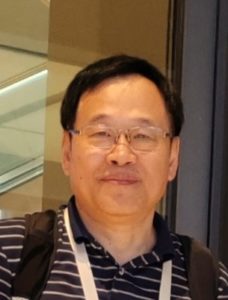









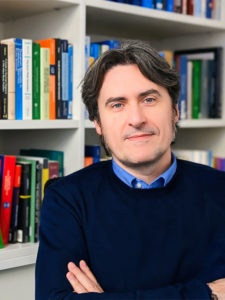
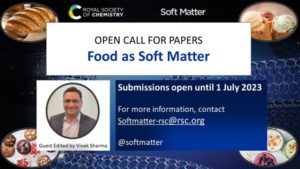


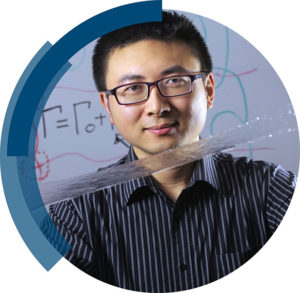 We announced Professor Xuanhe Zhao (MIT, USA) as the winner of the
We announced Professor Xuanhe Zhao (MIT, USA) as the winner of the 
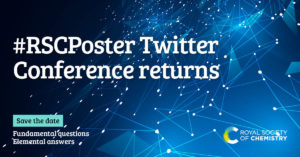
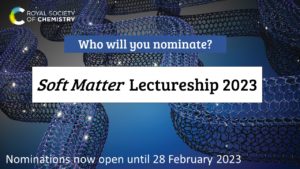
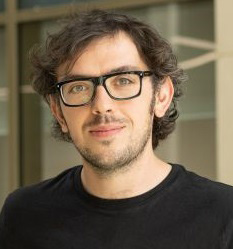 Dr. Richard Mandle was awarded BSc and MSc degrees in Chemistry from the University of Hull. He completed his PhD in Chemistry under the supervision of Professor John Goodby FRS at the University of York in 2013 (thesis title: “The Nitro Group in Liquid Crystals”). In postdoctoral positions he developed new materials for consumer LCD devices and worked on developing materials that exhibit new nematic phase types (York), as well as on auxetic elastomers (Leeds). Dr. Mandle has published over 80 peer reviewed journal articles, was awarded the Young Scientist award of the British Liquid Crystal Society in 2017 and the Vorländer Lectureship of the German Liquid Crystal Society in 2022. In 2022 Dr. Mandle was awarded a prestigious UKRI Future Leaders Fellowship which he holds as a joint appointment between the School of Chemistry and the School of Physics and Astronomy at the University of Leeds.
Dr. Richard Mandle was awarded BSc and MSc degrees in Chemistry from the University of Hull. He completed his PhD in Chemistry under the supervision of Professor John Goodby FRS at the University of York in 2013 (thesis title: “The Nitro Group in Liquid Crystals”). In postdoctoral positions he developed new materials for consumer LCD devices and worked on developing materials that exhibit new nematic phase types (York), as well as on auxetic elastomers (Leeds). Dr. Mandle has published over 80 peer reviewed journal articles, was awarded the Young Scientist award of the British Liquid Crystal Society in 2017 and the Vorländer Lectureship of the German Liquid Crystal Society in 2022. In 2022 Dr. Mandle was awarded a prestigious UKRI Future Leaders Fellowship which he holds as a joint appointment between the School of Chemistry and the School of Physics and Astronomy at the University of Leeds.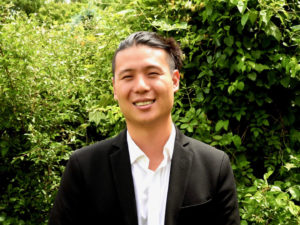 Charles Dhong is currently an Assistant Professor in Materials Science and Biomedical Engineering at University of Delaware. He received a PhD from Johns Hopkins University followed by postdoctoral studies at University of California, San Diego. His
Charles Dhong is currently an Assistant Professor in Materials Science and Biomedical Engineering at University of Delaware. He received a PhD from Johns Hopkins University followed by postdoctoral studies at University of California, San Diego. His 
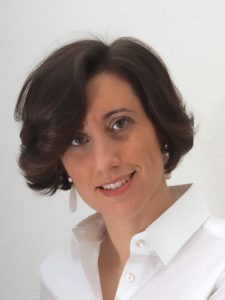 Eleonora Secchi is currently the Group Leader of the
Eleonora Secchi is currently the Group Leader of the